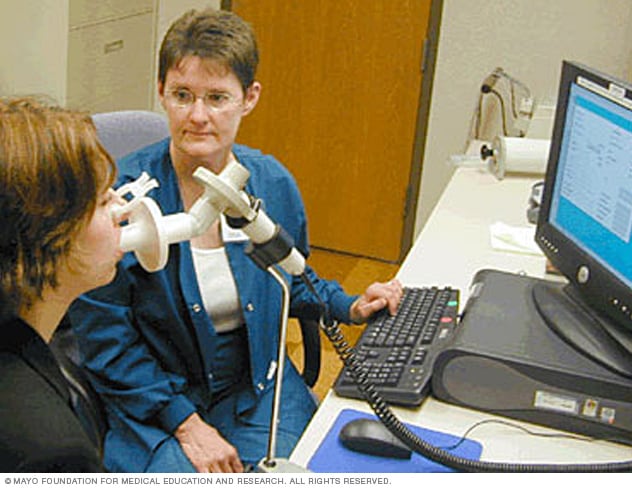Diagnosis
Spirometer

Spirometer
A spirometer measures how much air your lungs can hold and how quickly you can breathe out.
During the first few days of illness, it can be difficult to distinguish the signs and symptoms of bronchitis from those of a common cold. During the physical exam, your doctor will use a stethoscope to listen closely to your lungs as you breathe.
In some cases, your doctor may suggest the following tests:
- Chest X-ray. A chest X-ray can help determine if you have pneumonia or another condition that may explain your cough. This is especially important if you ever were or currently are a smoker.
- Sputum tests. Sputum is the mucus that you cough up from your lungs. It can be tested to see if you have illnesses that could be helped by antibiotics. Sputum can also be tested for signs of allergies.
- Pulmonary function test. During a pulmonary function test, you blow into a device called a spirometer, which measures how much air your lungs can hold and how quickly you can get air out of your lungs. This test checks for signs of asthma or emphysema.
Treatment
Most cases of acute bronchitis get better without treatment, usually within a couple of weeks.
Medications
Because most cases of bronchitis are caused by viral infections, antibiotics aren't effective. However, if your doctor suspects that you have a bacterial infection, he or she may prescribe an antibiotic.
In some circumstances, your doctor may recommend other medications, including:
- Cough medicine. If your cough keeps you from sleeping, you might try cough suppressants at bedtime.
- Other medications. If you have allergies, asthma or chronic obstructive pulmonary disease (COPD), your doctor may recommend an inhaler and other medications to reduce inflammation and open narrowed passages in your lungs.
Therapies
If you have chronic bronchitis, you may benefit from pulmonary rehabilitation — a breathing exercise program in which a respiratory therapist teaches you how to breathe more easily and increase your ability to exercise.
Clinical trials
Explore Mayo Clinic studies testing new treatments, interventions and tests as a means to prevent, detect, treat or manage this condition.
Lifestyle and home remedies
To help you feel better, you may want to try the following self-care measures:
- Avoid lung irritants. Don't smoke. Wear a mask when the air is polluted or if you're exposed to irritants, such as paint or household cleaners with strong fumes.
- Use a humidifier. Warm, moist air helps relieve coughs and loosens mucus in your airways. But be sure to clean the humidifier according to the manufacturer's recommendations to avoid the growth of bacteria and fungi in the water container.
- Consider a face mask outside. If cold air aggravates your cough and causes shortness of breath, put on a cold-air face mask before you go outside.
Preparing for your appointment
You're likely to start by seeing your family doctor or a general practitioner. If you have chronic bronchitis, you may be referred to a doctor who specializes in lung diseases (pulmonologist).
What you can do
Before your appointment, you may want to write a list that answers the following questions:
- Have you recently had a cold or the flu?
- Have you ever had pneumonia?
- Do you have any other medical conditions?
- What drugs and supplements do you take regularly?
- Are you exposed to lung irritants at your job?
- Do you smoke or are you around tobacco smoke?
You might also want to bring a family member or friend to your appointment. Sometimes it can be difficult to remember all the information provided. Someone who accompanies you may remember something that you missed or forgot.
If you've ever seen another physician for your cough, let your present doctor know what tests were done, and if possible, bring the reports with you, including results of a chest X-ray, sputum culture and pulmonary function test.
What to expect from your doctor
Your doctor is likely to ask you a number of questions, such as:
- When did your symptoms begin?
- Have your symptoms been continuous or occasional?
- Have you had bronchitis before? Has it ever lasted more than three weeks?
- In between bouts of bronchitis, have you noticed you are more short of breath than you were a year earlier?
- Do your symptoms affect your sleep or work?
- Do you smoke? If so, how much and for how long?
- Have you inhaled illicit drugs?
- Do you exercise? Can you climb one flight of stairs without difficulty? Can you walk as fast as you used to?
- Does anything improve or worsen your symptoms?
- Does cold air bother you?
- Do you notice that you wheeze sometimes?
- Have you received the annual flu shot?
- Have you ever been vaccinated against pneumonia? If so, when?